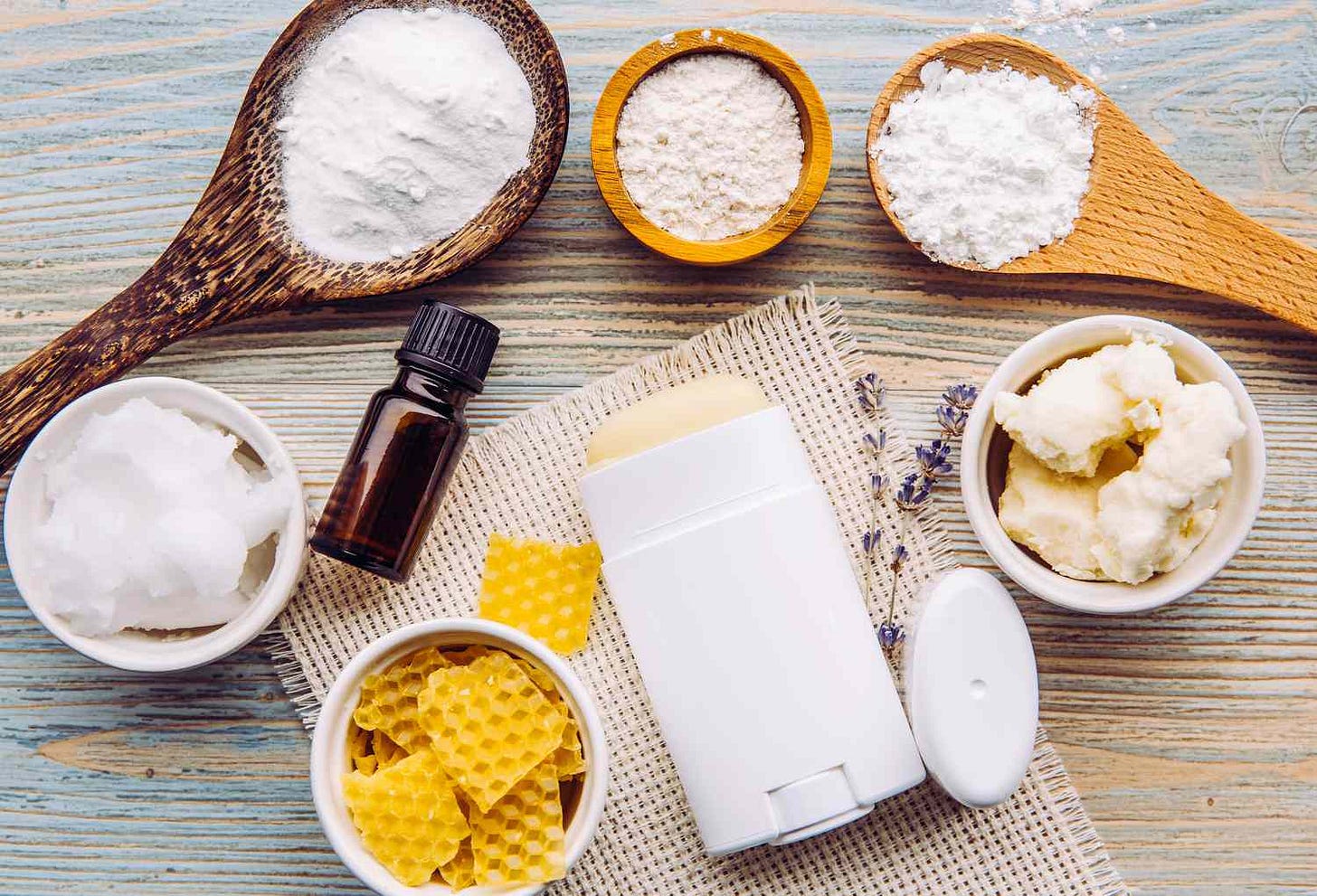Aluminum in my deodorant, fluoride in my toothpaste, and phthalates in my makeup.
What's a poor girl to do?
Happy Tuesday and Christmas Eve, Health Heroes! (If you thought the holidays would keep me from writing a weekly newsletter, you’ve underestimated my writing habits…)
We live in a crazy health culture that continually confuses us. We are supposed to look pretty, smell nice, not sweat, and smile with sparkling, straight teeth. But think about what it takes to pull all that beauty off: makeup, deodorant, perfume, antiperspirant, and hydrogen peroxide. Yikes!
Take antiperspirant and deodorant, for example. I recently heard a podcast proclaiming the healthful impact of using aluminum-free deodorant. I’ve gone back and forth about this topic based on wavering evidence over the years, but admittedly, I haven’t looked at it lately. So, I revisited this health topic wondering, Should I really care about aluminum in my deodorant? Is it really that dangerous? Or is this just a case of trying to scare people and offering a product for profit?
In this case, at the end of the podcast — there was a product, complete with a discount! This is not inherently bad, but it was persuasive and, honestly, tempting for even me.
At times like this, we must gather our wits and think logically. Emotions take over, primarily fear. Admittedly, I’ve had a fear of aluminum ever since I lost my mother-in-law to dementia - but the science doesn’t back that fear to the extent I feel the fear. And then, intuitively, I don’t think aluminum had anything to do with her succumbing to dementia, but it still makes me pause and think.
Curiosity in the form of thoughtful health decisions is healthy, so I decided to face aluminum in deodorant head-on using a health hero approach.
Then, I tackled a couple more in the following articles: the safety of fluoride and phthalates. So, let’s dive into these potentially harmful assaults with curiosity, look for evidence, and see what we can uncover!
Aluminum in deodorant – is it bad for us?
First and foremost, is aluminum, in general, bad for us? Here’s a public health statement for aluminum, albeit old. Take a look for yourself to see what it says. Surprisingly, we consume it daily in baked goods like flour, baking powder, antacids, and antiperspirants.
That means more aluminum over Christmas from Christmas treats like cookies. (I’m guilty – I made a ton of cookies — or did I? …I can’t remember. Just kidding.)
But what about deodorant? Deodorant doesn’t have aluminum – just elements that make you smell better. Antiperspirants, however, often contain aluminum, as do the products that combine the two.
Antiperspirants aim to plug the sweat glands so they don’t produce sweat. If you think about it from that perspective, it doesn’t sound so great to plug sweat glands, does it?
So, if that’s a concern for you, maybe you want to consider using deodorants, not antiperspirants, unless you’re trying to impress and not sweat under special circumstances. If that’s you every day, then maybe experiment with natural products instead.
Does your antiperspirant cause cancer?
What about the association of cancer with aluminum? Well, the science is not straightforward—it all depends on the research you find.
I found a study that showed a link between breast cancer and antiperspirants, but those subjects were using antiperspirants several times a day since they were in their 30s. If you use antiperspirants that often, it would be good to swap for aluminum-free products, I think.
While claims of links to breast cancer and Alzheimer’s exist, research shows minimal absorption of aluminum through the skin and no definitive evidence supporting these links. Major health organizations, including the FDA, WHO, and the American Cancer Society, consider aluminum safe for use. But think about this: The FDA requires that antiperspirants with aluminum have warning labels to warn those with kidney disease. But wait, the FDA states aluminum is safe, and research shows minimal absorption through the blood. How then, could deodorant be a threat to those with kidney disease? The truth is, and research shows this to be true, that our skin absorbs chemicals; it’s just a matter of how much.
Does your antiperspirant cause Alzheimer’s disease?
What about Alzheimer’s disease and aluminum exposure? A meta-analysis showed that those with Alzheimer's had higher levels of aluminum. Results showed that individuals chronically exposed to aluminum were 71% more likely to develop Alzheimer’s disease. However, they stated it was chronic exposure to aluminum. What is that, exactly, and are you and I subject to chronic exposure to aluminum and will using antiperspirants contribute to that exposure? You get to decide because there are no definitive answers to these questions.
What’s particularly alarming is that doctors can prescribe antiperspirants containing 10 to 30 times the aluminum chlorohydrate in over-the-counter products. I think doctors do their best to do a risk-benefit analysis as they prescribe these products to their patients, and they want to help their patients.
Sweating profusely all of the time can be a social problem, causing psychological stress. But has the patient been given a clear understanding of the risk? And what exactly is the risk? Unknown risk doesn’t equal no risk. We need to be wary and research before we use products—even those our doctors prescribe.
What does Europe think about aluminum in cosmetics like antiperspirants?
The Scientific Committee on Consumer Safety (SCCS) guides Europe’s rules and regulations for consumer products like cosmetics. What do they think about aluminum? In March 2024, they issued a report on aluminum in cosmetics. Here are the key points:
The SCCS found insufficient evidence about how much aluminum is absorbed through the skin during typical cosmetic use, making it hard to fully assess risks.
Aluminum in talc (up to 2%) is not absorbed into the body and is considered safe.
The SCCS recommends human studies to measure how much aluminum enters the body from cosmetics under real-world conditions.
While they didn’t flag major concerns, the SCCS emphasizes that more research is needed to ensure safety. This highlights how other countries approach these issues thoughtfully and rely on data to guide decisions.
More research is needed.
This was not exhaustive research, so keep researching to learn more. Scientists, please help us out and do more research! The bottom line is that you don’t want to be exposed to excess aluminum if you can help it – you’re already exposed enough by merely living on this earth. After all, aluminum is ubiquitous and the most abundant metal in the earth's crust. It’s true!
At the end of the day or early in the morning, whenever you use your underarm goop, stop to consider whether it might be worth swapping out a product with aluminum for one without.
What’s the worst thing that could happen? Oh yeah, you could sweat. Heaven forbid!
What concerns you most about the ingredients in your daily products? Have you made changes, or are you sticking with what works? Share your thoughts in the comments—I’d love to hear your perspective!
Stay tuned for fluoride fun in my next article! And have a great holiday, health heroes.
P.S. — I’m making little Christmas gifts for the girls in my life - a homemade sugar scrub. It takes less than 5 minutes to make and is much less expensive than purchasing a scrub at the store. Take 1 cup of coconut oil and 1/2 cup of sugar, and add whatever else you’d like to give it flare - lemon or orange zest, essential oils, or even vanilla! You can even add vitamin E oil - just a teaspoon or two will do the job. Just mix it up and put it in small jars and put a little bow on it, and there you have it - safe scrub that feels oh so nice on hands and overall body when you’re feeling a little dry over the winter. 🌲
Merry Christmas,
Dr. Alice
A little more about Dr. Alice Burron and The Health Navigator Group:
You can find more about The Health Navigator Group at our website: www.thehealthnavigator.org
On Instagram: @the.health.navigator
And learn more about Dr. Alice Burron at her website: draliceburron.com
Or via her personal Instagram: @dr_burron
You can even connect with her on LinkedIn, if you want to be professional about it. 👓
And if you’re not subscribed to our Substack, what are ya doing? It’s free, and packed full of useful tools to help you on your journey to better, faster healing.









